Washington rebukes Iran on anniversary of 1979 embassy takeover
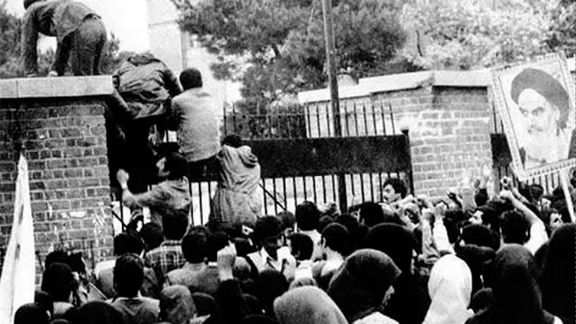
The United States on Tuesday condemned Iran’s record on international law and human rights on the 46th anniversary of the 1979 takeover of its embassy in Tehran.

The United States on Tuesday condemned Iran’s record on international law and human rights on the 46th anniversary of the 1979 takeover of its embassy in Tehran.
“The attack and seizure of the United States Embassy in Tehran marked the beginning of countless violations of international law and the Iranian regime’s refusal to accept diplomacy,” the State Department’s Persian-language account said in a post on X.
On November 4, 1979, pro-Islamic Republic students stormed the US embassy in Tehran and took 52 American diplomats and staff hostage for 444 days, leading to the rupture of diplomatic ties between Tehran and Washington that have never been restored.
The State Department’s post said the embassy takeover began “a long pattern of ignoring the rights of other nations and interfering in their affairs,” reflecting “the same disregard for fundamental rights and freedoms that today defines this regime’s behavior toward its own people.”
It added that the United States “remains determined to promote diplomacy, accountability, and the aspirations of the Iranian people for a brighter future.”
The statement comes as Iran marked the anniversary with state-organized rallies across the country earlier in the day.
Iranian Supreme Leader Ali Khamenei doubled down on his hard line backing the takeover in a speech on Monday.
"The people took to the streets, and part of these demonstrations and popular movements, with student participation, led to the seizure of the US embassy,” he said. "The US embassy was the center of conspiracies and plotting to destroy the Islamic Revolution.”
Crowds gathered across the country waving national flags and portraits of Iran’s leaders to observe what officials call the National Day of Fighting Global Arrogance.
In Tehran, effigies of US President Donald Trump and Israeli Prime Minister Benjamin Netanyahu being hanged were displayed during the state sponsored rally.
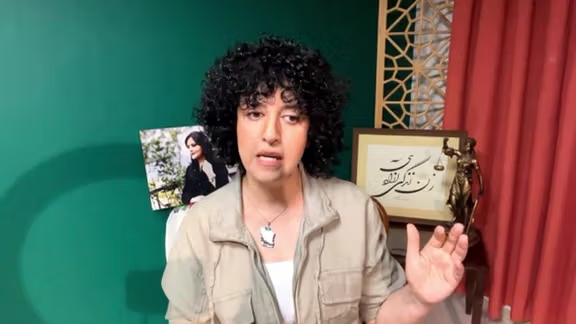
Iranian activist and Nobel laureate Narges Mohammadi said on Tuesday that there was no prospect for reforming the country's Islamic theocracy and its downfall was assured.
“Reform has been dead for years. The time for reforms has long passed. The real main struggle is between the realistic survivalists and those seeking the end of religious despotic regime,” Mohammadi posted on X on Tuesday.
“As a human rights defender and peace advocate and fundamentally based on the criteria of peace and human rights, I believe in a transition and am working to end the Islamic Republic as a religious despotic regime,” she added. “Victory is not easy, but it is certain.”
Mohammadi criticized talk of reform, calling it fruitless. “Our pact is freedom, democracy, and equality, whose key step is ending religious tyranny,” she said.
Iran's reform movement began in the 1990s under President Mohammad Khatami (1997-2005) and sought to promote civil liberties, press freedom and dialogue after years of hardline policies.
It peaked with the 2009 Green Movement protests led by reformist candidates Mirhossein Mousavi and Mehdi Karroubi against Mahmoud Ahmadinejad's disputed election victory.
Security forces crushed it with lethal violence, killing dozens and arresting thousands, stifling momentum.
In 2013 and 2017, moderate cleric Hassan Rouhani backed by sidelined reformists persuaded voters to choose him as what was widely called the “better of the two evils,” warning that electing another hardline Ahmadinejad-style president would be disastrous.
His first term saw a period of relative economic stability, particularly after the partial lifting of sanctions under the 2015 nuclear deal. But Donald Trump’s withdrawal from the accord and the return of US sanctions, followed by the government’s crackdown on economic protests in 2017 and 2018, left many voters disillusioned.
‘Sweeping change or collapse’
Calls for radical change have since persisted and mounted among some former officials, who warn of systemic collapse without overhaul.
Mohammad Sarafraz, a Supreme Cyberspace Council member and former head of the state broadcaster IRIB, urged sweeping reforms on Saturday in an interview with Khabar-e Fori, cautioning that without them, the Islamic Republic faces “war, collapse, or chaos.”
Even US talks or oil export gains won't fix deeper political and economic woes, he said, demanded fundamental reform rather than a mere change of president, advocating genuine public participation in governance.
In July, former government official and political activist Mostafa Tajzadeh warned Supreme Leader Ali Khamenei to pivot or resign.
"In this critical situation, Mr. Khamenei has no option but to apologize to the Iranian people and accept fundamental reforms in line with national demands, including by forming a constituent assembly based on completely free and fair elections," he said, "or to resign and step down."
In recent years, the pursuit of reform has shifted toward regime change, as seen in the 2017-18 and 2022 Woman, Life, Freedom uprisings, with many people viewing the system as irreformable.
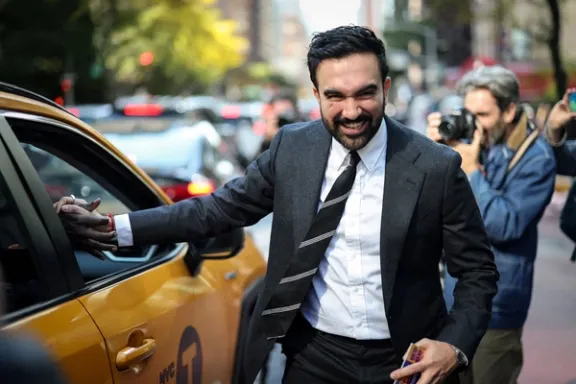
Some critics in Iran's diaspora are expressing skepticism about Zohran Mamdani, the Muslim and self-described Democratic socialist frontrunner in elections for New York City mayor on Tuesday, even likening his populist vision to Ayatollah Khomeini's 1979 Islamic Revolution.
Mamdani, a 34-year-old state assemblyman, won the Democratic primary in June, edging out former New York governor Andrew Cuomo.
Born in Uganda to parents of Indian descent, he was raised in New York and has championed affordability in a campaign which has belatedly earned the praise of some Democratic leaders. If elected he would be New York's first Muslim mayor.
His platform emphasizes affordable housing, police reform and Palestinian rights, earning him strong backing from progressives and Muslim organizations.
But his left-leaning and pro-Palestine positions have unsettled some Iranian exiles who see echoes of populist and millenarian promises they say marred their homeland in the 1979 Islamic Revolution.
"Modern Iranian history flashes a bright caution sign as America’s far left and Islamist movements converge in our cities and universities," Andrew Ghalili, senior analyst at advocacy group the National Union for Democracy in Iran, wrote in The New York Sun.
"Iranians have seen this movie before, and the American left are playing their role perfectly. It’s only a matter of time until the tragic third act," he added.
Mamdani was criticized for using the phrase "globalize the intifada" during the mayoral primary, a phrase referring to a Palestinian uprising years after campus protests against Israel's incursion into Gaza beginning at Columbia University in New York spread nationwide and inflamed debates about free speech and anti-Semitism.
He has since distanced himself from the slogan and has campaigned with representatives of many faiths, including Jewish and Muslim leaders.
Many first and second-generation immigrants from Iran are conservative and skeptical of the role of Islam in public life, holding up the nearly 50-year-old Islamic theocracy in their homeland as a cautionary tale.
Mamdani has hit out at what he has called Islamophobia in the wake of the 9/11 attacks but has not cited Islam as a basis of his political outlook.
University of Illinois at Chicago PhD candidate and commentator Sana Ebrahimi criticized Mamdani’s promises of free services on X, comparing them to Ayatollah Khomeini’s unfulfilled pledges.
“Every time I see those curated photos of Zohran Mamdani, I am reminded of Khomeini as a ‘humble servant of the people,'" she wrote. "Four and a half decades later, Iran is destroyed and its currency has been gutted. Grand promises are easy and that is Zohran’s game plan."
On the campaign trail, Mamdani said his aunt feared riding the New York subway in the wake of the 9/11 of attack for fear of being persecuted for her Islamic veil.
Iranian dissident Masih Alinejad, who resides in New York City, urged Mamdani to protect the rights of all citizens, including those who reject the hijab.
She was speaking after a US court in Manhattan last month convicted two men of attempting to kill her in a plot backed by Tehran.
“(Mamdani) said his aunt removed her hijab in New York because she didn’t feel safe. Well, I don’t feel safe in New York because the real killers, backed by Iran - the top sponsor of Hamas - came after me twice here simply for saying no to hijab. So yes, Mayor, step up and protect this city from terrorist organizations,” she posted on X.
In a podcast appearance with conservative New York Times columnist Bret Stephens, Alinejad appeared to suggest Mamdani was a "radical" whose rise coincided with more public displays of Islamic and pro-Iranian activity in America.
"Let's talk about my concern in the West, in America, in New York City, the rise of radicals," she said. "There are more than 300 mosques in New York. What is it about this fantasizing with the radicals, saying we want to pray in the streets. So let's just talk about Mamdani."
Polls show Mamdani leading rivals Andrew Cuomo and Curtis Sliwa as voters weigh issues such as housing and crime.
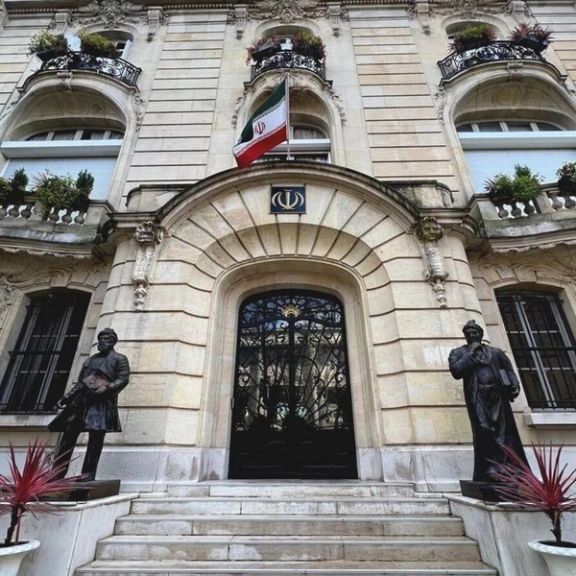
Iran’s embassy in Paris coordinated a decades-long campaign to influence French political, academic and media spheres, according to a new report by French think tank France2050.
The organization's inaugural 120-page report said Iran has maintained a “structured system of infiltration” in France for decades through its diplomats and cultural institutions.
The report compiled by journalists, historians and former intelligence officials, said Tehran had maintained a “structured system of infiltration” in France for decades through diplomats and cultural institutions.
France2050 is led by Gilles Platret, a former mayor and vice president of a center right party. The report's editorial directors, Emmanuel Razavi and Jean-Marie Montali, are authors of books on Iranian influence abroad.
The document was submitted to the Interior Ministry, the Senate and the National Assembly to inform policymakers about foreign influence operations in France, according to its authors.
“In France, the number two of the Iranian embassy, Ali Reza Khalili, was responsible for establishing an influence network: recruiting and directing ‘agents,’ whether they were aware of being manipulated or not,” the report said.
It described Khalili as chief of staff to the Iranian ambassador and president of the Franco-Iranian Center, an association created in 2016 that regularly hosted conferences, cultural events and training sessions.
These activities, the authors wrote, enabled Tehran to “identify and recruit potential interlocutors in academia, civil society and the media.”
Embassy accused of coordinating propaganda
The report called the Iranian embassy in Paris “the European anchor of the Revolutionary Guards’ influence operations.”
Citing European counter-espionage sources, it said the mission served simultaneously as “a cultural center, a propaganda unit and a coordination office for the surveillance of the diaspora and the repression of opponents abroad.”
Several embassy staff members officially registered as diplomats were identified by European services as belonging to Iran’s Ministry of Intelligence (MOIS) or the Quds Force, according to the document.
The embassy allegedly supervised cultural and religious institutions such as the Centre Culturel Islamique d’Iran in Paris, which the report called “a discreet but effective relay for Tehran’s propaganda.”
The France2050 authors also cited links between the embassy and regional Shiite associations in Lyon and Villeurbanne, describing joint events attended by Iranian diplomats “often without public mention of their participation.”
Recruitment in universities and civil society
According to the document, the embassy and the Franco-Iranian Center offered scholarships, internships and trips to Iran to “students or researchers demonstrating open-mindedness toward Iranian culture,” which it characterised as a form of recruitment for influence operations.
Targets included “young intellectuals, journalists in training, or NGO activists susceptible to anti-Western or anti-imperialist rhetoric,” the report said.
The embassy also allegedly directed a digital influence campaign using social-media accounts tied to Iranian state outlets such as Press TV, Al-Alam and Hispan TV.
Cyber-monitoring referenced in the report found recurring links between these French-language networks and the embassy’s communications unit, with some account administrators participating in events run by Ali Reza Khalili’s center.
The campaigns, the report added, aimed to “create ideological confusion, erode trust in democratic institutions and normalize the Iranian regime’s positions in the French political and media landscape.”
It warned that the absence of an EU terrorist designation for the Revolutionary Guards allowed operatives “to travel, fundraise and coordinate freely across Schengen countries.”

A fire at the Parsian Oil Refinery in Eyvanaki, in Iran’s Semnan province east of Tehran, killed one worker and injured three others on Tuesday, provincial officials said.
The blaze started in a bitumen storage tank at the refinery in the Jannatabad industrial zone and was briefly contained before reigniting, said Hossein Derakhshan, head of the Semnan Red Crescent.
He said firefighting and rescue teams from Eyvanaki, Garmsar, and nearby towns were deployed to the site, and the fire was expected to be fully extinguished within hours.
The cause of the incident is under investigation.
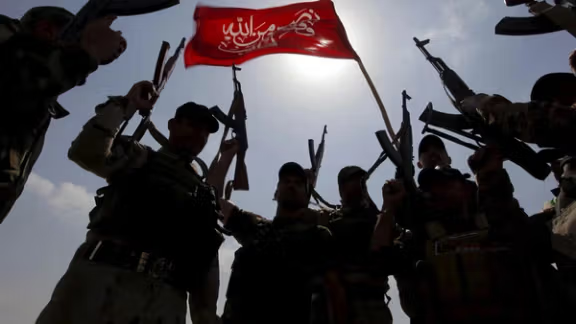
Iran is supplying Shi’ite militias in Iraq with more advanced weapons in preparation for a possible new round of fighting with Israel, Israeli media reported on Tuesday.
Citing Iraqi sources familiar with the matter, Israel’s public broadcaster Kan Reshet Bet said Tehran had stepped up arms transfers to allied groups in Iraq following losses suffered by Iran-backed factions in Lebanon, Syria and Gaza.
The report said Iran appeared to be shifting the focus of its regional military influence toward Iraqi militias.
The station said the Islamic Revolutionary Guard Corps’ Quds Force was training fighters for potential coordinated ground and air operations, while the groups themselves feared strikes from Israel and the United States.
The sources said the militias take orders from Tehran more than from Iraq’s Prime Minister Mohammed Shia al-Sudani, who has sought to keep his country out of regional escalation.
Reports in Israeli outlets including Walla and The Jerusalem Post last week said the Israel Defense Forces and intelligence agencies were preparing for possible attacks by Iranian-aligned groups in Iraq.
The Post said Tehran was investing resources to strengthen these militias and establish what it called “terror infrastructure” capable of striking Israel when ordered.
Iranian Quds Force commander Esmail Ghaani visited Iraq late in October for talks with senior militia leaders.
Al-Sudani said earlier this year that his government had blocked dozens of attempted attacks by Iran-backed groups during the 12-day conflict between Iran and Israel in June.
In an interview with the Associated Press, he said Baghdad must carefully balance relations with both Washington and Tehran.